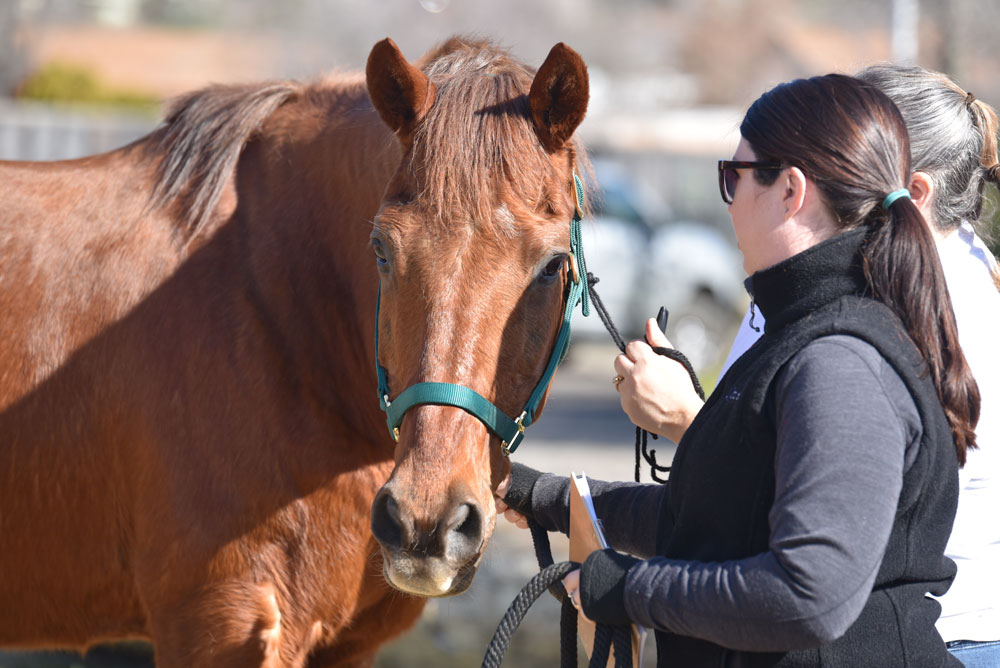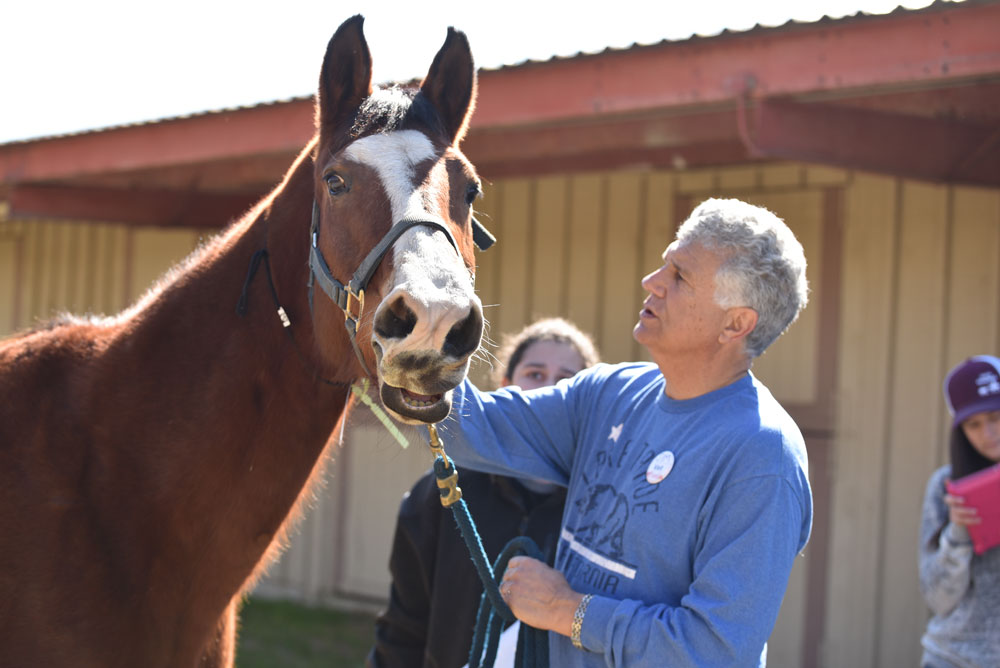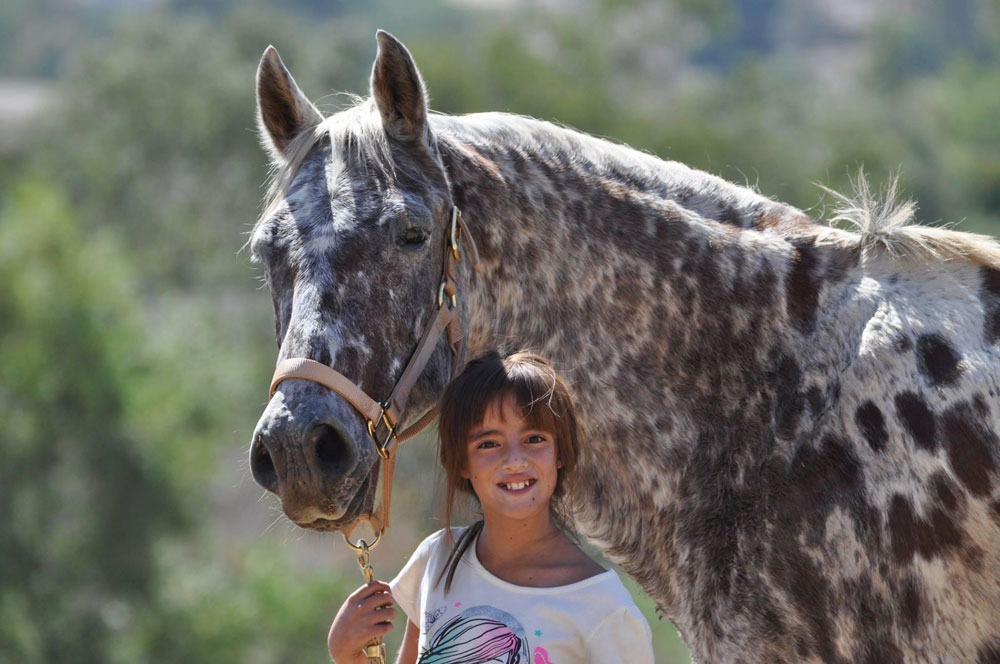No matter how well they are cared for, many of the horses in backyard pastures or boarding barns will eventually need to be rehomed. This can happen when the animal’s owner becomes challenged by changing finances, illness, age or even death. Still, many owners fail to plan for a time when they cannot keep their horses for any reason. Read on to learn more about caring for horses through tough times.

A volunteer helps with horse intake at a One-Day Open Door Clinic in California. Photo courtesy Horse Plus Humane Society
It’s a reality that horse welfare advocates have increasingly been pondering, says animal behaviorist Emily Weiss, Ph.D., CAAB, vice president of the ASPCA Equine Welfare Department.
“We want to create a safety net for horses,” she says. “We want to find ways to provide owners with alternatives so they can prevent their horse from becoming at-risk.”
Tough Times: Reasons for Rehoming Horses
When caring for horses through tough times, here are some reasons as to why horse owners will rehome their horses. According to Weiss, a recent ASPCA survey of 211 owners who rehomed their horses revealed that in addition to direct financial challenges, moving and human health issues ranked high among reasons why owners become compelled to sell, surrender or otherwise rehome their horses.
In fact, any significant lifestyle shift can determine whether or not an owner can continue to keep a horse, says Tawnee Preisner, founder and president of the Horse Plus Humane Society.
“In one case we had a woman who had to give up her horse because she had a young child and a baby, and just couldn’t take care of the horse anymore,” Preisner recalls. “If you have financial challenges or are ill, it may not be realistic to keep your horse.”
According to Preisner, doing what’s right begins with providing the animal with the training most likely to make him attractive to prospective adopters.
“That means horses that are trained to have basic skills, such as the ability to be led, to stand for grooming or the farrier, and to be ridden,” she says.
But even affording help from a trainer can be difficult for some owners, says Weiss.
“Forty-five percent of the people we surveyed said that access to safety net services would have allowed them to keep their horse,” Weiss explains.
Challenging Times: Vet and Farrier Services for Horses
Vet and farrier services can feel like a burden when caring for horses through tough times. Likewise, even the most basic veterinary care can be too expensive for owners experiencing difficult times. That lack of care not only puts horses at risk for health issues, but it can also diminish their rehoming potential and even threaten their lives.
Sometimes owners are able to draw on their relationships to negotiate lower-cost veterinarian services and farrier fees. But others don’t have those connections.
In response, the ASPCA has partnered with the international animal health product manufacturer Zoetis. Together, they’ve launched a pilot project that encourages veterinarians to identify owners in their own communities with at-risk horses that might benefit from lower-cost equine healthcare services. The project is also networking with farriers to provide lower-cost services to the owners of those horses.
“The push is to provide services in order to keep horses in their current homes and out of rehoming organizations when that is best for the horse,” Weiss says. “Rehoming organizations have finite resources.”
These safety net services allow owners to provide regular health and farrier care for their horses even if they are compelled to rehome them eventually.
“This way, you can be sure that the horse has been getting the veterinary care he needs up until the time that he is surrendered,” says Preisner.
Challenging Times: How Horses are Surrendered
When caring for horses through tough times, horse owners can become more stressed out when they know they have to surrender a horse. When that time comes, knowing where and how to surrender a horse for rehoming can be challenging to already financially and emotionally distraught horse owners. Respondents to a survey of those relinquishing their horses say they were looking for options for long periods of time before being able to find a safe option.
“We asked them how long they had been thinking about rehoming their horses, and on average they said 15 months,” says Weiss. “They said they just didn’t have the opportunity to do so.”
In response, the ASPCA has opened an Equine Regional Support Center to provide a safe place for horse owners to relinquish horses that need rehoming. Located in Dallas, the center provides no-cost veterinary care and euthanasia services to financially strapped horse owners. It’s a pilot program that may be replicated in other parts of the U.S., according to Weiss.

At a One-Day Open Door event, Jim Garfinkle, DVM, evaluates a horse. Photo courtesy Horse Plus Humane Society
Open Door to All Horses
In the meantime, the One-Day Open Door Clinic program has long been a staple of the rehoming program at Horse Plus Humane Society. The clinics allow owners in California and Tennessee to surrender their horses to the adoption organization with no questions asked.
“Horses can be surrendered to us to be adopted or to be humanely euthanized,” Preisner explains. “All you have to do is bring us the horse.”
According to Preisner, the clinics give owners an opportunity to get out from under those things that challenge their ability to look after their animals. At the same time, it provides them with an alternative to offering the animals for sale on the internet or selling them at auction.
“Many people don’t realize that just because slaughter plants closed in this country doesn’t mean the horses can’t go to slaughter,” Preisner points out. “Sometimes if the horse isn’t trained or the owners can’t find ways to provide care during hard times, people are actually setting their horses up for slaughter.”
That’s why Preisner thinks One-Day Open Door events provide owners with a chance to do their horses a final kindness. “If you’re sick and can’t take care of your horse, or you’re making end-of-life plans and have no one who is willing to take care of your horse, the best thing you can do is to humanely euthanize him,” says Preisner. “Euthanizing a horse is OK, and people need to realize that making this decision doesn’t make them a bad person.”
Planning Ahead
When caring for horses through tough times, horse owners can still plan ahead and look towards the future. Some owners are including their animals in their own end-of-life plans. Using wills, trusts and specially developed protection documents, owners can provide specific directives for their horse’s care.
As property, horses named in an owner’s will may be passed on to a specific beneficiary named in the estate. Owners may also establish specific bank accounts to provide revenue for everything from feed and veterinary care to farrier services to maintain the horse after the owner has died or become disabled.
Funds are disbursed to a designated caretaker in regular amounts at specified intervals as required. It’s exactly the kind of document that would have been beneficial when Ken Chin inherited a dozen Arabian show horses named in his cousin’s will.
“She intended to set up a trust for them, but she died before she could do it,” Chin recalls. “Fortunately, because they were so well-known on the show circuit, I was able to find homes for all of them.”
Naming a Caretaker
Finally, owners may use a pet protection agreement (PPA) document to name a caretaker and to dictate everything from the brand of feed the horses will be fed to which veterinarian is to deliver health care.
Developed by and available exclusively through animal law attorney Rachel Hirschfeld, owners may also use PPAs to designate funds to be used for the animal’s care as well as to name who should receive payouts and when.
“You can name a guardian for your horse and open an account at your regular bank using your social security number, with the guardian as a co-signer or signer on the account,” says Hirschfeld.
Hirschfeld says that the documents are recognized as legal in all U.S. states and that one PPA covers all of an owner’s animals, whether the owner is deceased or permanently unable to care for them.
“Let’s say you had an accident but you didn’t die—who’s going to read the will?” says Hirschfeld.
Whatever legal tools you consider, you should discuss your options with financial and legal advisers before you commit to one.
Finally, whatever you decide, Preisner believes owners must make sure that their horses are poised to make the most appropriate transition.
“Ultimately, people have to do what’s best for the horse,” she says.
This article originally appeared in the November 2018 issue of Horse Illustrated magazine. Click here to subscribe!




